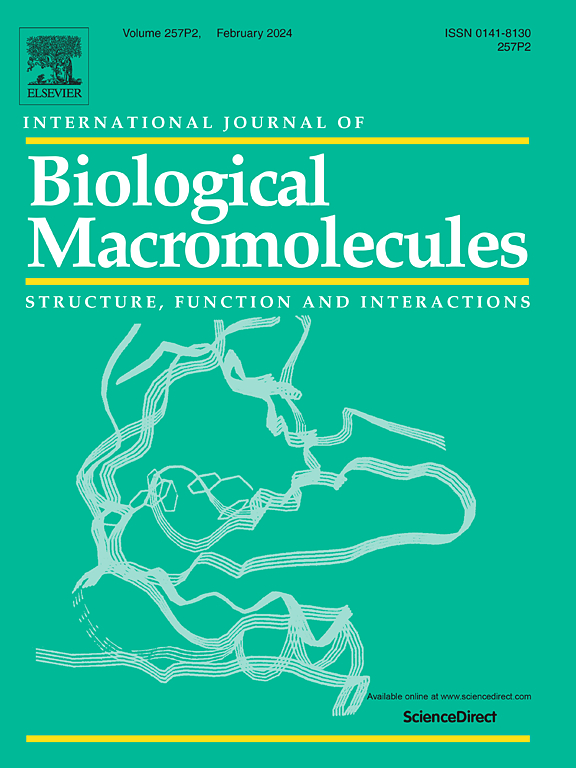Oyster polysaccharides alleviate cyclophosphamide-induced immunosuppression in mice by modulating lymphocytes profile and maintaining intestinal homeostasis
IF 7.7
1区 化学
Q1 BIOCHEMISTRY & MOLECULAR BIOLOGY
International Journal of Biological Macromolecules
Pub Date : 2025-06-17
DOI:10.1016/j.ijbiomac.2025.145273
引用次数: 0
Abstract
Oyster polysaccharides (OPS) have garnered growing attention due to their anti-inflammatory, antioxidant, and gut microbiota-modulating properties. However, the underlying immunomodulatory mechanisms of OPS remain incompletely elucidated. This study aimed to investigate the effects of OPS on immune function of mice with cyclophosphamide (Cy)-induced immunosuppression. OPS effectively modulated immune cell profiles in both spleen and intestinal tissues, significantly increased the percentages of CD4+ and CD8+ T cells and repaired intestinal mucosal damage. Furthermore, OPS enhanced the secretion of intestinal immune cytokines by activating MAPK signaling pathway, leading to notable increases in IL-2 (from 44.25 ± 17.39 to 82.56 ± 17.50 pg/mL), IFN-γ (from 176.05 ± 28.08 to 308.71 ± 53.75 pg/mL), IL-1β (from 35.74 ± 6.17 to 54.12 ± 4.54 pg/mL), and TNF-α (from 117.06 ± 8.34 to 241.46 ± 66.11 pg/mL). Additionally, OPS ameliorated Cy-induced intestinal microbiota dysbiosis by significantly boosting the relative abundance of beneficial bacteria, including Ligilactobacillus, Alloprevotella, Odoribacter, and Alistipes. Meanwhile, OPS upregulated levels of key intestinal metabolites such as short-chain fatty acids, glycine, and imidazoleacetic acid. These findings indicate that OPS could improved Cy-induced immunosuppression and modulate gut microbiota, which highlights its potential as a promising candidate for novel immunoregulatory agents.
牡蛎多糖通过调节淋巴细胞分布和维持肠道内稳态来缓解环磷酰胺诱导的小鼠免疫抑制
牡蛎多糖(OPS)因其抗炎、抗氧化和调节肠道微生物群的特性而受到越来越多的关注。然而,OPS的潜在免疫调节机制尚未完全阐明。本研究旨在探讨OPS对环磷酰胺(Cy)诱导免疫抑制小鼠免疫功能的影响。OPS能有效调节脾和肠组织的免疫细胞谱,显著提高CD4+和CD8+ T细胞的百分比,修复肠黏膜损伤。此外,OPS通过激活MAPK信号通路增强了肠道免疫细胞因子的分泌,导致IL-2(从44.25±17.39增加到82.56±17.50 pg/mL)、IFN-γ(从176.05±28.08增加到308.71±53.75 pg/mL)、IL-1β(从35.74±6.17增加到54.12±4.54 pg/mL)和TNF-α(从117.06±8.34增加到241.46±66.11 pg/mL)显著升高。此外,OPS通过显著提高有益菌的相对丰度,改善了cy诱导的肠道微生物群失调,包括Ligilactobacillus、Alloprevotella、Odoribacter和Alistipes。同时,OPS上调了短链脂肪酸、甘氨酸和咪唑乙酸等关键肠道代谢物的水平。这些结果表明,OPS可以改善cy诱导的免疫抑制和调节肠道微生物群,这凸显了它作为一种有前景的新型免疫调节剂的潜力。
本文章由计算机程序翻译,如有差异,请以英文原文为准。
求助全文
约1分钟内获得全文
求助全文
来源期刊
CiteScore
13.70
自引率
9.80%
发文量
2728
审稿时长
64 days
期刊介绍:
The International Journal of Biological Macromolecules is a well-established international journal dedicated to research on the chemical and biological aspects of natural macromolecules. Focusing on proteins, macromolecular carbohydrates, glycoproteins, proteoglycans, lignins, biological poly-acids, and nucleic acids, the journal presents the latest findings in molecular structure, properties, biological activities, interactions, modifications, and functional properties. Papers must offer new and novel insights, encompassing related model systems, structural conformational studies, theoretical developments, and analytical techniques. Each paper is required to primarily focus on at least one named biological macromolecule, reflected in the title, abstract, and text.

 求助内容:
求助内容: 应助结果提醒方式:
应助结果提醒方式:


